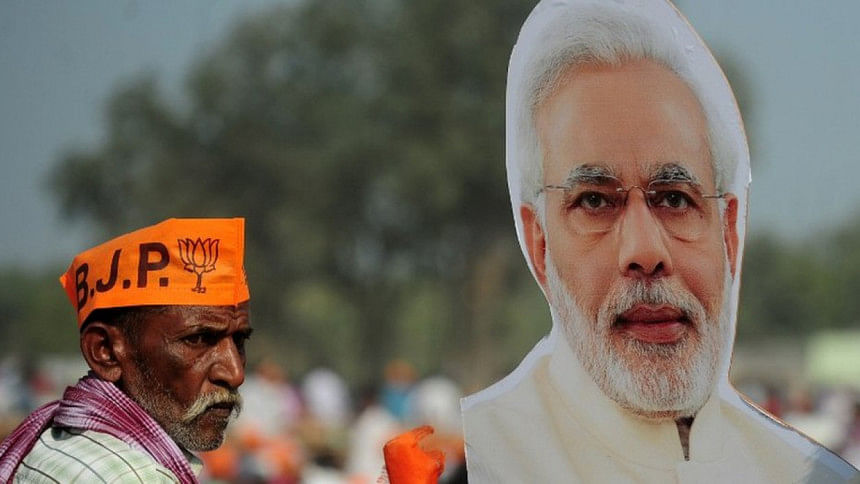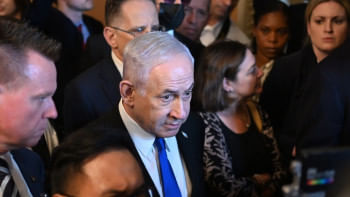Narendra Modi and his newfound power

After Modi's landslide victory in the trend-setting states of India, three straight gains have been garnered by BJP as the party in power and Narendra Modi as the country's prime minister.
In the first place, the outcome may be viewed as a mid-term endorsement of Modi government. Normally, beyond the half way point of a government's tenure, it would look for a vindication of some sorts. And Modi needed a vote of confidence following the rattling demonetisation exercise a few months back. Much as the opposition tried to capitalise on the issue, voters were amnesic, being reconciled to it as a drive against black money and corruption - a symbolic effort to bridge the rich-poor gap.
Secondly, the election results may have bolstered Modi's chances of clinching a second term as prime minister in 2019.
Last but not least, the outcome amplifies BJP's strength in the Rajya Sabha, the upper House of the legislature. This will facilitate the passage of bills required to be routed through both the Houses of Parliament for an enactment.
Now the question is: With such strengthening of his political position or clout, would Modi turn autocratic at home and try to play 'big brother' in the region?
On the domestic front, there's a concern that he might aggressively pursue his far-right agendas. Actually, he had played the Hindutva and caste cards in line with BJP chief Amit Shah's masterstroke of an electoral strategy for UP in particular. The party concentrated on a so-called 60 percent formula based on the assumption that Muslims and majority of Yadavs and Jatavs will not vote for BJP. Thus, on the one hand, BJP emphasised on Hindutva, refraining from allocating any seat to Muslim candidates; on the other, it did some social engineering by granting 150 seats to non-Yadav OBC, i.e. other backward castes. The social intervention also included alignment with sub-regional parties like Apna Dal and Sahadev Bharatiya Samaj Party (BSP).
For social re-engineering to be durable after the election, it needs to cast off its exclusionary content and be somewhat inclusive. Besides, although BJP captured a large number of seats in UP, the percentage of votes tallied by it works out to 34 percent,
Thus, the reality checks are there for BJP, so as not to be too aggressive with its far-right predilections.
A Times of India piece commented that Modi's political strength may help him go around Mamata Banerjee's obstructions to work out a 'deeper security and resource-sharing relationship with Bangladesh'. On the face of it, we thought that problems centring around sharing of common river waters, including Teesta water sharing in particular, would be effectively addressed by a stronger Modi government.
Yet, updated versions from the Indian media and comments or snippets in the local press thereon suggest that India may be looking for strategic/defense accords, including the arrangement for cooperation in Blue Economy. There is no official confirmation on these serious matters that admit of no unilateral approach to be sure, so that we treat them as part of a speculative realm unless proved otherwise.
It is worth mentioning that when Modi assumed power three years ago he had invited all heads of government of the Saarc region to his oath-taking ceremony. It was acclaimed as Modi's 'Neighbour First' policy. A man of his pragmatism and increased economic and political clout should lead the way to harmony and peace in the region.
You had Narendra Modi tweeting with a two-fold response to his triumph: First, he expressed his jubilation at the advent of what he called a "new India", standing for development and progress based on the strength and dexterity of 1.25 billion people. He wants to take the process of creating a new India forward.
Pointing to the 75th anniversary of India's birth in 2022, he set himself and the people a task of creating an India that Mahatma Gandhi, Sardar Ballavbhai Patel and Ambedkar would be proud of. No mention of anyone from the Nehru—Gandhi family.
An anti-dynastic flair is discernable.
Some analysts, however, tend to wonder whether the Gujarati leader is approaching the mass appeal of independent India's most popular politician yet - Jawaharlal Nehru!
BJP chief Amit Shah claimed at a post-election press conference that "Modi has emerged as the most popular (Indian) leader since independence (surpassing Nehru)."
Such complimentary drawing of parallels goes on in terms of the vote-catching charisma of Nehru and Modi, if not their respective statures. But in contrast, the BJP camp avoids making references to Indira Gandhi or Rajiv Gandhi, to say nothing of Rahul and Priyanka, even Mulayem Singh Jadav and Akhilesh. The torch-bearers of their respective dynasties are swamped by the saffron tsunami.
Nehru had been critiqued by his detractors for being a parliamentary autocrat, even though at heart he was staunchly democratic and secularist. Would Modi be autocratic minus Nehru's secularist beliefs?
The writer is a commentator on current affairs and former Associate Editor, The Daily Star.

 For all latest news, follow The Daily Star's Google News channel.
For all latest news, follow The Daily Star's Google News channel. 



Comments